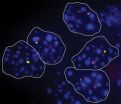(Press-News.org) PHILADELPHIA— Half of melanoma patients with the BRAF mutation have a positive response to treatment with BRAF inhibitors, but nearly all of those patients develop resistance to the drugs and experience disease progression.
Now, a new preclinical study published online ahead of print in the Journal of Clinical Investigation from Penn Medicine researchers found that in many cases the root of the resistance may lie in a never-before-seen autophagy mechanism induced by the BRAF inhibitors vermurafenib and dabrafenib. Autophagy is a process by which cancer cells recycle essential building blocks to fuel further growth. Block this pathway with the antimalarial drug hydroxycholoroquine (HCQ), the authors found, and the BRAF inhibitors will be able to do their job better.
"This study opens the door for combination therapy with BRAF inhibitors and autophagy inhibitors, which haven't been explored deeply as a therapeutic option for patients whose tumors are resistant," said Ravi K. Amaravadi, MD, assistant professor of Medicine in the division of Hematology/Oncology at the Perelman School of Medicine and co-Leader of the Cancer Therapeutics Program at Penn Medicine's Abramson Cancer Center. "Here, we show that the BRAF inhibitors induce autophagy as a way to escape cell death, which gives us clues on how to interfere with this mechanism of resistance and improve outcomes for these patients."
Based on these promising preclinical results, Dr. Amaravadi and his team have already launched a clinical trial for patients with advanced BRAF mutant melanoma to see how well-tolerated HCQ is with the BRAF inhibitor vemurafenib. "So far," he said, "we are seeing a benefit to patients and low toxicity."
BRAF inhibitors are a first line of treatment for melanoma patients who harbor the BRAF mutation, which is an abnormal change in a gene that causes some melanoma tumors to grow and spread more aggressively. While 50 percent of patients initially respond to that treatment, nearly 100 percent exhibit disease progression seven months after treatment, making it imperative to find a way to re-sensitize the tumor to treatment.
Autophagy has emerged as a key pathway that cancer cells use to survive in the face of assault by chemotherapy and radiation. However, autophagy as a potential druggable mechanism in patients who become resistant to BRAF inhibitors has not been investigated.
Using tumor biopsies from BRAF melanoma patients treated with either BRAF inhibitors or with combined BRAF and MEK inhibitors, a recently FDA-approved drug combination to fight the other mechanisms of resistance, the researchers found that tumors resistant to the BRAF inhibitors had increased levels of autophagy compared with baseline tumors. Moreover, the level of therapy-induced autophagy was correlated with lower response rates and shorter progression-free survival times.
The researchers also examined BRAF mutant melanoma cell lines, and found that BRAF inhibition induced autophagy by way of an endoplasmic reticulum (ER) stress response. The binding of a BRAF mutation to the ER stress gatekeeper GRP78 is a new and unexpected molecular interaction driving resistance, and establishes a new signaling axis that has multiple drug targets, Dr. Amaravadi said.
What's more, the researchers found that blocking this mechanism with HCQ--a drug used to treat malaria that has been shown in previous studies to block autophagy--limited BRAF inhibitor-induced autophagy and enhanced cancer cell death in mouse models.
"As the use of BRAF inhibitors become more widespread, we'll need to discover new options for our patients so they can overcome this destined resistance," said Dr. Amaravadi. "Here, we have a new pathway that links the BRAF mutation to ER stress and autophagy that could be exploited with an already-approved FDA drug, which I believe could be a game changer for this group of patients."
Next steps are to continue to enroll patients in the clinical trial investigating autophagy inhibitors in combination with BRAF inhibitors and potentially other, emerging new drug combinations proven to improve patient response.
INFORMATION:
Other Penn authors include Xiao-Hong Ma, Sheng-Fu Piao, Quentin Mcafee, Giorgos Karakousis, Lori S. Hart, Samuel Levi, Janice Hu, Xiaowei Xu, Wei Xu, Lynn M. Schuchter, Jeffrey Winkler, Constantinos Koumenis; Jessie Villaneuva, Gao Zhang, and Meenhard Harlyn from the Wistar Institute; Rossitza Lazova and Vincent Klump from Yale University; and Michael A. Davies from MD Anderson Cancer Center.
Editor's note: Inquiries for the clinical trial (a phase I trial of vemurafenib and hydroxychloroquine for patients with BRAF mutant melanoma; clinicaltrials.gov: NCT01897116) may be directed to Victoria Baldassarre 215-662-7615.
Blocking autophagy with malaria drug may help overcome resistance to melanoma BRAF drugs
Researchers pinpoint new molecular mechanism in autophagy, spurs melanoma clinical trial
2014-02-24
ELSE PRESS RELEASES FROM THIS DATE:
Like mom or dad? Some cells randomly express one parent's version of a gene over the other
2014-02-24
Cold Spring Harbor, NY – We are a product of our parents. Maybe you have your mother's large, dark eyes, and you inherited your father's infectious smile. Both parents contribute one copy, or allele, of each gene to their offspring, so that we have two copies of every gene for a given trait – one from mom, the other from dad. In general, both copies of a gene are switched on or off as an embryo develops into an adult. The "switching on" of a gene begins the process of gene expression that ultimately results in the production of a protein.
Occasionally, a cell will arbitrarily ...
Caring for patients with multiple chronic conditions -- New research and future challenges
2014-02-24
Philadelphia, Pa. (February 21, 2014) – The millions of Americans living with more than one chronic disease are at high risk of poor health outcomes, and account for a disproportionate share of health care costs. A special March supplement to Medical Care presents updates from the Agency for Healthcare Research and Quality's (AHRQ) Multiple Chronic Conditions (MCC) Research Network, formed to address knowledge gaps and research challenges in meeting the complex health care needs of this growing population. The journal is published by Lippincott Williams & Wilkins, a part ...
Nearly half of uninsured children live in immigrant families, reports study in Medical Care
2014-02-24
Philadelphia, Pa. (February 21, 2014) – Children from immigrant families now account for 42 percent of uninsured children in the United States, reports a study in the March issue of Medical Care. The journal is published by Lippincott Williams & Wilkins, a part of Wolters Kluwer Health.
More than two-thirds of uninsured children with immigrant parents are US citizens, according to an analysis of nationwide survey data by Eric E. Seiber, PhD, of The Ohio State University College of Public Health, Columbus. He writes, "Initiatives to expand coverage or increase Medicaid ...
Preventing suicide should start in a general medical setting
2014-02-24
The mental health conditions of most people who commit suicide remain undiagnosed, even though most visit a primary care provider or medical specialist in the year before they die. To help prevent suicides, health care providers should therefore become more attuned to their patients' mental health state and possible suicide ideation. These are the findings of Brian Ahmedani from the Henry Ford Health System in Detroit, Michigan, in a new study¹ documenting the type and timing of health services sought by Americans who commit suicide. The study is the largest geographically ...
Did you hear the one about the doctor?
2014-02-24
LEBANON, NH (Feb. 24, 2014) – In a study that demonstrates the potential of using social networking sites for research on health and medicine, Dartmouth researchers studied jokes made about doctors posted on Facebook.
"Social networking sites, such as Facebook, have become immensely popular in recent years and present a unique opportunity for researchers to eavesdrop on the collective conversation of current societal issues," said Matthew Davis of The Dartmouth Institute of Health Policy & Clinical Practice.
In one of the first studies of social networking site conversations ...
Exclusive David Gancberg article in Human Gene Therapy
2014-02-24
New Rochelle, NY, February 24, 2014—Over the past three funding stages, the European Commission has invested nearly $475 million in 100 projects in the gene transfer and gene therapy field. David Gancberg, Directorate-General for Research and Innovation, European Commission (Brussels), describes the substantial opportunities for funding to support basic and clinical research in gene and cell therapy to find new treatments for chronic and rare diseases and novel regenerative medicine approaches in a Commentary article in Human Gene Therapy, a peer-reviewed journal from Mary ...
Volcanoes contribute to recent warming 'hiatus'
2014-02-24
LIVERMORE, Calif. -- Volcanic eruptions in the early part of the 21st century have cooled the planet, according to a study led by Lawrence Livermore National Laboratory. This cooling partly offset the warming produced by greenhouse gases.
Despite continuing increases in atmospheric levels of greenhouse gases, and in the total heat content of the ocean, global-mean temperatures at the surface of the planet and in the troposphere (the lowest portion of the Earth's atmosphere) have shown relatively little warming since 1998. This so-called 'slow-down' or 'hiatus' has received ...
Personalized medicine best way to treat cancer, study argues
2014-02-24
If a driver is traveling to New York City, I-95 might be their route of choice. But they could also take I-78, I-87 or any number of alternate routes. Most cancers begin similarly, with many possible routes to the same disease. A new study found evidence that assessing the route to cancer on a case-by-case basis might make more sense than basing a patient's cancer treatment on commonly disrupted genes and pathways.
The study found little or no overlap in the most prominent genetic malfunction associated with each individual patient's disease compared to malfunctions ...
On the road to Mottronics
2014-02-24
"Mottronics" is a term seemingly destined to become familiar to aficionados of electronic gadgets. Named for the Nobel laureate Nevill Francis Mott, Mottronics involve materials – mostly metal oxides - that can be induced to transition between electrically conductive and insulating phases. If these phase transitions can be controlled, Mott materials hold great promise for future transistors and memories that feature higher energy efficiencies and faster switching speeds than today's devices. A team of researchers working at Berkeley Lab's Advanced Light Source (ALS) have ...
New ideas change your brain cells: UBC research
2014-02-24
A new University of British Columbia study identifies an important molecular change that occurs in the brain when we learn and remember.
Published this month in Nature Neuroscience, the research shows that learning stimulates our brain cells in a manner that causes a small fatty acid to attach to delta-catenin, a protein in the brain. This biochemical modification is essential in producing the changes in brain cell connectivity associated with learning, the study finds.
In animal models, the scientists found almost twice the amount of modified delta-catenin in the brain ...
LAST 30 PRESS RELEASES:
Study reveals insights about brain regions linked to OCD, informing potential treatments
Does ocean saltiness influence El Niño?
2026 Young Investigators: ONR celebrates new talent tackling warfighter challenges
Genetics help explain who gets the ‘telltale tingle’ from music, art and literature
Many Americans misunderstand medical aid in dying laws
Researchers publish landmark infectious disease study in ‘Science’
New NSF award supports innovative role-playing game approach to strengthening research security in academia
Kumar named to ACMA Emerging Leaders Program for 2026
AI language models could transform aquatic environmental risk assessment
New isotope tools reveal hidden pathways reshaping the global nitrogen cycle
Study reveals how antibiotic structure controls removal from water using biochar
Why chronic pain lasts longer in women: Immune cells offer clues
Toxic exposure creates epigenetic disease risk over 20 generations
More time spent on social media linked to steroid use intentions among boys and men
New study suggests a “kick it while it’s down” approach to cancer treatment could improve cure rates
Milken Institute, Ann Theodore Foundation launch new grant to support clinical trial for potential sarcoidosis treatment
New strategies boost effectiveness of CAR-NK therapy against cancer
Study: Adolescent cannabis use linked to doubling risk of psychotic and bipolar disorders
Invisible harms: drug-related deaths spike after hurricanes and tropical storms
Adolescent cannabis use and risk of psychotic, bipolar, depressive, and anxiety disorders
Anxiety, depression, and care barriers in adults with intellectual and developmental disabilities
Study: Anxiety, gloom often accompany intellectual deficits
Massage Therapy Foundation awards $300,000 research grant to the University of Denver
Gastrointestinal toxicity linked to targeted cancer therapies in the United States
Countdown to the Bial Award in Biomedicine 2025
Blood marker from dementia research could help track aging across the animal world
Birds change altitude to survive epic journeys across deserts and seas
Here's why you need a backup for the map on your phone
ACS Central Science | Researchers from Insilico Medicine and Lilly publish foundational vision for fully autonomous “Prompt-to-Drug” pharmaceutical R&D
Increasing the number of coronary interventions in patients with acute myocardial infarction does not appear to reduce death rates
[Press-News.org] Blocking autophagy with malaria drug may help overcome resistance to melanoma BRAF drugsResearchers pinpoint new molecular mechanism in autophagy, spurs melanoma clinical trial




